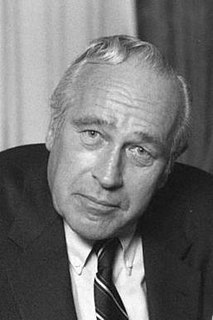A Quote by Robert Ludlum
A man's weaknesses may intrude on his faith but they do not diminish it.
Related Quotes
The disappointed man turns his thoughts toward a state of existence where his wiser desires may be fixed with the certainty of faith; the successful man feels that the objects which he has ardently pursued fail to satisfy the cravings of an immortal spirit; the wicked man turneth away from his wickedness, that he may save his soul alive.
Two great virtues . . . give a man power with the heavens - integrity and purity of character. Let a man possess these, let his heart be true and unflinching, let his life be pure, and, if we add to these humility, he is protected against a multitude of weaknesses and can resist a host of temptations. We all have our weaknesses; God has permitted them that we might be taught humility in ourselves and charity towards others.
A nominal Christian often discovers in suffering that his faith has been in his church, denomination, or family tradition, but not Christ. As he faces evil and suffering, he may lose his faith. But that’s actually a good thing. I have sympathy for people who lose their faith, but any faith lost in suffering wasn’t a faith worth keeping.
A man's a man for a' that. . . . . A prince can mak a belted knight, A marquis, duke, and a' that; But an honest man's aboon his might, Guid faith he mauna fa' that! . . . Then let us pray that come it may, As come it will for a' that, That sense and worth, o'er a' the earth, May bear the gree and a' that. For a' that, and a' that, It's comin' yet, for a' that, When man to man, the world o'er, Shall brithers be for a' that.
Everybody was talking about the religious man who committed suicide. While no one in the monastery approved of the man's action, some say they admired his faith. Faith?" said the Master. He had the courage of his convictions, didn't he?" That was fanaticism, not faith. Faith demands a greater courage still: to reexamine one's convictions and reject them if they do not fit the facts.
Any man who stands for progress has to criticize, disbelieve and challenge every item of the old faith. Item by item he has to reason out every nook and corner of the prevailing faith. If after considerable reasoning one is led to believe in any theory or philosophy, his faith is welcomed. His reasoning can be mistaken, wrong, misled and sometimes fallacious. But he is liable to correction because reason is the guiding star of his life. But mere faith and blind faith is dangerous: it dulls the brain, and makes a man reactionary.





































